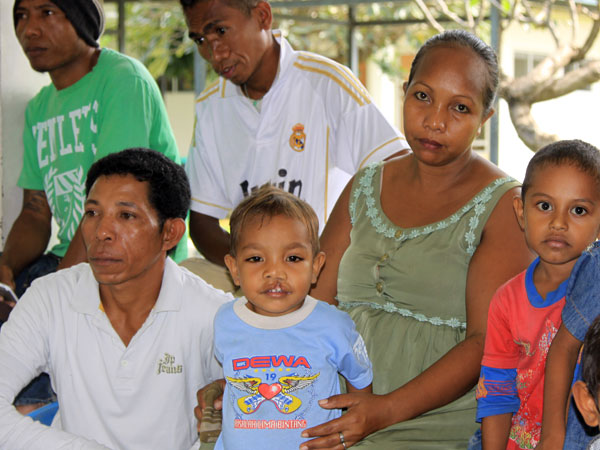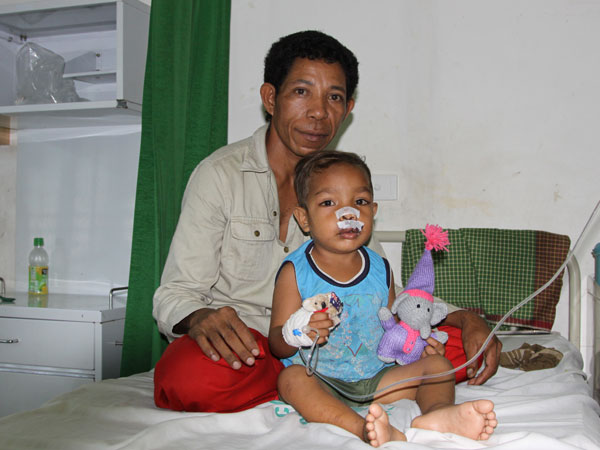East Timor Cleft Lip & Palate Project
The Australasian Begg Society of Orthodontists was approached in 2012 by Mr Mark Moore, a prominent Adelaide Craniofacial and Plastic Surgeon who has been visiting East Timor for some time providing care to cleft lip and palate patients, as well as general plastic surgery work.
The work, supported in part by the Royal Australian College of Surgeons is based in Dili and has been serving patients from all parts of East Timor for over 10 years.
Mark had been becoming increasingly aware that many of his early cleft patients are now reaching an age where the orthodontic phase of their overall management needed attention, so that East Timor cleft patients received the same standard of overall care that would be expected in western countries. This would be undertaken to improve both the functional aspects and aesthetic/social problems associated with cleft lip and cleft palate.
To date, two visits have been made by the Executive of the Australasian Begg Society of Orthodontists to establish the feasibility of becoming involved in the mid to long term in such a project from the point of view of:
- looking at the available facilities,
- meeting some local people involved with the provision of health care,
- investigating the alternatives of providing some limited orthodontic treatment for cleft lip and palate patients and,
- if possible do some examinations of cleft lip and palate patients.
Manpower
There are only seven practicing dentists in East Timor. Dental treatment in Dili is available at the government hospital clinic. It is also being undertaken under the supervision of Drs Terry Yuen and Richard Salter who, through the support of Lions Australia, established a dental clinic in Dili the early 1990’s. They visit East Timor 2 to 3 times each year, when they also travel to the more remote towns and villages. Both in Dili and in the rural areas they work in collaboration
Cuban dentists, whose command of English does not permit conversation, man the government clinic. At Dr Yuen’s private clinic all staff speak English and appear keen to be involved in assis
ting by replacing broken brackets and undertaking other emergency repairs. They are Maria, the organizer and manager of the clinic and Dominguez who provides the day-to-day dental care.
Facilities
The dental facilities are adequate but rudimentary. There is no operational dental X-ray machine but there is a functional chair with suction and a compressor. The clinic has a working autoclave. Infection control is basic but adequate.
Demand for services
Potential patient numbers are unclear at present. Cleft lip and palate are more common in East Timor and other areas of South East Asia. Whilst there is undoubtedly a genetic component to this, environmental factors such as diet and nutrition may also be implicated.
It is estimated that over 200 CLP patients have had surgery over the last 10 years about half of whom live in Dili. These patients will have no problems getting into the Clinic. Those in remote areas will have more problems, but in some areas, the Church can transport people in groups. However, in some of the more remote areas bus transport may be required, and this could be problematic for those in remote areas, who are too poor to afford the $2 return bus fare.
Recommendations
Initial assessment. An orthodontist with cleft lip and palate experience shaoul assess all patients from the Dili area, for a discussion about what might be offered and what is possible. The feasibility of treatment is will depend, not only on the types of presenting malocclusions but also the awareness of dental health and the standard of dental care.
These discussions should include Maria and Dominguez from the outset. As there is no experience of orthodontics a discussion about the need for regular appointments will be essential.
Once the first 10-15 or so patients are identified, there would be enough work to justify 1-2 day trips to place braces and provide ongoing care. We cannot run an appointment book, so patients can only be given a day to attend. Plenty of time will be needed initially until we all have some experience and become familiar with the process!
Treatment Planning. Limited treatment only for alignment, function and aesthetics, probably maxillary teeth only should be the initial aim. Dominguez is trained to provide impressions, so we can get him to take models for us. We could also teach him to take photos, and perhaps in the near future he could do this work for us.
Treatment Protocols. Once some patients have been seen, we need to draw up a protocol for treatment, so everyone has a plan to follow. As we expect different orthodontists to see the patients, we need a clear plan to follow.
Instruments and supplies. We will need to be self sufficient in supplies, so at some stage we will need an inventory of what will be required so we can get donations and supplies. I suggest each person takes their own headlight if they want overhead lighting.
Travel. Six to eight trips per year of 2 days work initially should be planneed. There is an Air North plane that leaves Darwin daily at 0545, so you can be at the clinic by 0900. The flight takes around 75 minutes, and the time zone is GMT +9 hours. The return plane leaves at 0800. Visas are obtained at Dili airport for US$30, and departure tax is US$10.
School holidays are to be avoided, and there are 3 terms. We need to establish the dates for 2014 before deciding on any dates.
Facilities. Lions are considering a second surgery, which has been offered to use to use in the long term if we wish. The plan is to enclose part of the verandah, which would give a surgery with two windows, about 4m x 2.5m in area. There is a “spare” dental chair, unused apparently at Bacau, which we have been offered if we want it.
There would be a cost to enclose to second surgery of about US$5000, and we will need to contribute significantly if we want it to happen. Also we need to consider storage for instrument and supplies, and probably a small refrigerator.
A dedicated mobile suction unit will be essential. We can run a line to the other compressor.
Donations of cash via Lions are tax deductible, as it is a registered charity.
Accommodation. There are two rooms (each with 2 beds) for accommodation at the PAS clinic. These are available for visitors to use. Alternatively people can stay at in the city area for US$50-130/night depending on the standard. Terry Yuen has offered the use of the clinic vehicle to get around in. It is an ex army Toyota “troop carrier” in reasonable order.
Sponsorship. There will be expenses to consider.
- Travel and accommodation. This should be at each person’s own expense. We can stay for as long or short time as we wish anyway.
- Instruments and supplies. We can ask for donations from companies and usually buy things at the wholesale/factory price. We should be careful about donations of equipment, as it needs to be serviceable and what we need. Also we need to get equipment over there, which might also cost and take a while.
- I would be optimistic that the membership will donate some money. Also the Begg Society and perhaps ASO may be interested.
- Cash Donations would be preferable so we have some flexibility in what we use it for. The main initial expense will be in setting up a surgery and in instruments.
- Lions can assist us in co-ordinating donations, and the surgery building.
- At worst if the project does not continue, we will have contributed to a new surgery for the PAS Clinic
Overall this seems a most worthwhile project for the Australasian Begg Society of Orthodontists to become involved in, provided the necessary challenges can be met and overcome. If it is feasible, we look forward to bringing appropriate orthodontic services to a developing Australian neighbour, currently unable to resource the required manpower and infrastructure for themselves.
Mark Leedham
Secretary, ABSO




